- Home
- Beverly Cleary
Ramona Quimby, Age 8 Page 3
Ramona Quimby, Age 8 Read online
Page 3
Everyone at Ramona’s table gasped. Ramona needed a moment to realize what had happened. Her egg was raw. Her mother had not boiled her egg at all. She tried to brush the yellow yolk and slithery white out of her hair and away from her face, but she only succeeded in making her hands eggy. Her eyes filled with tears of anger, which she tried to brush away with her wrists. The gasps at her table turned into giggles. From another table, Ramona caught a glimpse of Yard Ape grinning at her.
Marsha, a tall girl who always tried to be motherly, said, “It’s all right, Ramona. I’ll take you to the bathroom and help you wash off the egg.”
Ramona was not one bit grateful. “You go away,” she said, ashamed of being so rude. She did not want this third-grade girl treating her like a baby.
The teacher who was supervising lunch period came over to see what the commotion was about. Marsha gathered up all the paper napkins from the lunch boxes at the table and handed them to the teacher, who tried to sop up the egg. Unfortunately, the napkins did not absorb egg very well. Instead, they smeared yolk and white around in Ramona’s hair. Her face felt stiff as egg white began to dry.
“Take her to the office,” the teacher said to Marsha. “Mrs. Larson will help her.”
“Come on, Ramona,” said Marsha, as if Ramona were in kindergarten. She put her hand on Ramona’s shoulder because Ramona’s hands were too eggy to touch.
Ramona jerked away. “I can go by myself.” With that reply, she ran out of the cafeteria. She was so angry she was able to ignore the giggles and the few sympathetic looks of the other children. Ramona was mad at herself for following a fad. She was furious with Yard Ape for grinning at her. Most of all she was angry with her mother for not boiling the egg in the first place. By the time she reached the office, Ramona’s face felt as stiff as a mask.
Ramona almost ran into Mr. Wittman, the principal, which would have upset her even more. He was someone Ramona always tried to avoid ever since Beezus had told her that the way to remember how to spell the kind of principal who was the principal of a school was to remember the word ended in p-a-l, not p-l-e, because the principal was her pal. Ramona did not want the principal to be her pal. She wanted him to mind his own business, aloof and important, in his office. Mr. Wittman must have felt the same way because he stepped—almost jumped—quickly aside.
Mrs. Larson, the school secretary, took one look at Ramona, sprang from her desk, and said, “Well, you need a little help, don’t you?”
Ramona nodded, grateful to Mrs. Larson for behaving as if eggy third graders walked into her office every day. The secretary led her into a tiny room equipped with a cot, washbasin, and toilet that adjoined the office.
“Let’s see,” said Mrs. Larson, “how shall we go about this? I guess the best way is to wash your hands, then dunk your head. You’ve heard of egg shampoos, haven’t you? They are supposed to be wonderful for the hair.”
“Yow!” yelped Ramona, when she dipped her head into the washbasin. “The water’s cold.”
“It’s probably a good thing we don’t have warmer water,” said Mrs. Larson. “You wouldn’t want to cook the egg in your hair, would you?” She rubbed and Ramona snuffled. She rinsed and Ramona sniffed. Finally Mrs. Larson said, “That’s the best I can do,” and handed Ramona a wad of paper towels. “Dry yourself off the best you can,” she said. “You can wash your hair when you get home.”
Ramona accepted the towels. As she sat on the cot, rubbing and blotting and seething in humiliation and anger, she listened to sounds from the office, the click of the typewriter, the ring of the telephone, Mrs. Larson’s voice answering.
Ramona began to calm down and feel a little better. Maybe Mrs. Kemp would let her wash her hair after school. She could let Willa Jean pretend to be working in a beauty shop and not say anything about her Sustained Silent Reading. One of these days Willa Jean was sure to catch on that she was just reading a book, and Ramona wanted to postpone that time as long as possible.
Toward the end of lunch period, Ramona heard teachers drift into the office to leave papers or pick up messages from their boxes. Then Ramona made an interesting discovery. Teachers talked about their classes.
“My class has been so good today,” said one teacher. “I can hardly believe it. They’re little angels.”
“I don’t know what’s the matter with my class today,” said another. “Yesterday they knew how to subtract, and today none of them seems able to remember.”
“Perhaps it’s the weather,” suggested another teacher.
Ramona found all this conversation most interesting. She had blotted her hair as best she could when she heard Mrs. Whaley’s big cheerful voice speaking to Mrs. Larson. “Here are those tests I was supposed to hand in yesterday,” she said. “Sorry I’m late.” Mrs. Larson murmured an answer.
Then Mrs. Whaley said, “I hear my little show-off came in with egg in her hair.” She laughed and added, “What a nuisance.”
Ramona was so stunned she did not try to hear Mrs. Larson’s answer. Show-off! Nuisance! Did Mrs. Whaley think she had broken a raw egg into her hair on purpose to show off? And to be called a nuisance by her teacher when she was not a nuisance. Or was she? Ramona did not mean to break an egg in her hair. Her mother was to blame. Did this accident make her a nuisance?
Ramona did not see why Mrs. Whaley could think she was a nuisance when Mrs. Whaley was not the one to get her hands all eggy. Yet Ramona had heard her say right out loud that she was a show-off and a nuisance. That hurt, really hurt.
Ramona sat as still as she could with the damp paper towels in her hands. She did not want to risk even the softest noise by throwing them into the wastebasket. Lunch period came to an end, and still she sat. Her body felt numb and so did her heart. She could never, never face Mrs. Whaley again. Never.
Mrs. Larson’s typewriter clicked cheerfully away. Ramona was forgotten, which was the way she wanted it. She even wanted to forget herself and her horrible hair, now drying into stiff spikes. She no longer felt like a real person.
The next voice Ramona heard was that of Yard Ape. “Mrs. Larson,” he said, as if he had been running in the hall, “Mrs. Whaley said to tell you Ramona didn’t come back after lunch.”
The typing stopped. “Oh, my goodness,” said Mrs. Larson, as she appeared in the doorway. “Why, Ramona, are you still here?”
How was Ramona supposed to answer?
“Run along back to class with Danny,” said the secretary. “I’m sorry I forgot all about you.”
“Do I have to?” asked Ramona.
“Of course,” said Mrs. Larson. “Your hair is almost dry. You don’t want to miss class.”
Ramona did want to miss class. Forever. The third grade was spoiled forever.
“Aw, come on, Ramona,” said Yard Ape, for once not teasing.
Surprised by sympathy from Yard Ape, Ramona reluctantly left the office. She expected him to go on ahead of her, but instead he walked beside her, as if they were friends instead of rivals. Ramona felt strange walking down the hall alone with a boy. As she trudged along beside him, she felt she had to tell someone the terrible news. “Mrs. Whaley doesn’t like me,” she said in a flat voice.
“Don’t let old Whaley get you down,” he answered. “She likes you OK. You’re a good kid.”
Ramona was a little shocked at hearing her teacher called “old Whaley.” However, she squeezed comfort from Yard Ape’s opinion. She began to like him, really like him.
When they reached their classroom, Yard Ape, perhaps thinking he had been too nice to Ramona, turned and said to her with his old grin, “Egghead!”
Oh! There was nothing for Ramona to do but follow him into the room. Sustained Silent Reading, or DEAR, as Mrs. Whaley called it, was over, and the class was practicing writing cursive capital letters. Mrs. Whaley was describing capital M as she wrote it on the board. “Swoop down, swoop up, down, up again, and down.” Ramona avoided looking at her teacher as she got out paper and pencil and began to wr
ite the capital letters of the alphabet in careful, even script. She enjoyed the work, and it soothed her hurt feelings until she came to the letter Q.
Ramona sat looking at the cursive capital Q, the first letter of her last name. Ramona had always been fond of Q, the only letter of the alphabet with a neat little tail. She enjoyed printing Q, but she did not like her written Q. She had made it right, but it looked like a big floppy 2, which Ramona felt was a dumb way to make such a nice letter.
Ramona decided right then and there that she would never again write a cursive Q. She would write the rest of her last name, uimby, in cursive, but she would always, no matter what Mrs. Whaley said, print her capital Q’s.
So there, Mrs. Whaley, thought Ramona. You can’t make me write a cursive Q if I don’t want to. She began to feel like a real person again.
4
The Quimbys’ Quarrel
“But Ramona,” said Mrs. Quimby on Saturday, “I’ve already told you that I boiled several eggs so I wouldn’t have to boil an egg for you every morning. I put the boiled eggs on one shelf in the refrigerator and the raw eggs on another. In my hurry, I took an egg from the wrong shelf. I am sorry. There is nothing more I can say.”
Ramona remained silent. She felt mean and unhappy because she wanted to forgive her mother, but something in that dark, deep-down place inside her would not let her. Hearing her teacher call her a show-off and a nuisance hurt so much she could not stop being angry at almost everyone.
Mrs. Quimby sighed in a tired sort of way as she gathered up sheets and towels to feed into the washing machine in the basement. Ramona stared out the window and wished the misty rain, which fell softly and endlessly, would go away so she could go outdoors and roller-skate away her bad feelings.
Beezus was no help. She had spent the night at Mary Jane’s house with several other girls, and they had stayed up late watching a horror movie on television and eating popcorn. Afterward they stayed awake talking, too scared to go to sleep. That morning Beezus had come home tired and grouchy and had fallen asleep almost immediately.
Ramona wandered around the house looking for something to do, when she discovered her father sitting on the couch, pencil in hand, drawing pad on his knee, frowning at one bare foot.
“Daddy, what are you doing that for?” Ramona wanted to know.
“That’s what I keep asking myself,” her father answered, as he wiggled his toes. “I have to draw a picture of my foot for my art class.”
“I wish we got to do things like that in my school,” said Ramona. She found pencil and paper, pulled off one shoe and sock, and climbed on the couch beside her father. Both studied their feet and began to sketch. Ramona soon found that drawing a foot was more difficult than she had expected. Like her father, she stared, frowned, drew, erased, stared, frowned, and drew. For a little while she forgot she was cross. She was enjoying herself.
“There,” said Ramona at last. She had drawn a good, not an excellent, foot. She looked at her father’s paper and was disappointed in what she saw. It was the kind of picture a teacher would pin up off in the corner where no one but the artist would notice it. Her father’s foot looked like a flipper. For the first time, Ramona began to doubt that her father was the best artist in the whole world. This thought made her feel sad in addition to reminding her she was cross at that world.
Mr. Quimby studied Ramona’s picture. “That’s not bad,” he said. “Not bad at all.”
“My foot is easier to draw.” Ramona felt as if she should apologize for drawing a better foot than her grown-up father. “My foot is sort of—neater,” she explained. “Your foot is kind of bony and your toes are hairy. That makes your foot harder to draw.”
Mr. Quimby crumpled his drawing and threw it into the fireplace. “You make me sound like Bigfoot,” he said with a rueful laugh, as he threw a cushion at Ramona.
The day dragged on. By dinner time Ramona still had not been able to forgive her mother, who looked even more tired. Mr. Quimby had crumpled several more unsatisfactory drawings of his foot, and Beezus had emerged from her room sleepy-eyed and half-awake, when her mother called the family to supper.
“I wish we could have corn bread again,” Ramona said, not because she particularly liked corn bread, but because she felt so cross she wanted to complain about something. Corn bread was a pretty shade of yellow, which would have looked cheerful on a misty day. She leaned forward to sniff the plate of food set before her.
“Ramona.” Even though her father did not speak the words, his voice said, “We do not sniff our food in this house.”
Ramona sat up. Broccoli and baked potato, both easy to eat. Pot roast. Ramona leaned closer to examine her meat. She could not find one bit of fat, and there was only a bit of gravy poured over her serving. Good. Ramona refused even the tiniest bit of fat. She did not like the slippery squishy feeling in her mouth.
“Delicious,” remarked Mr. Quimby, who did not feel he had to inspect his food before eating.
“Nice and tender,” said Beezus, beginning to cheer up after her hard night.
Ramona seized her fork, speared her meat to her plate, and began to saw with her knife.
“Ramona, try to hold your fork properly,” said her father. “Don’t grip it with your fist. A fork is not a dagger.”
With a small sigh, Ramona changed her hold on her fork. Grown-ups never remembered the difficulty of cutting meat when one’s elbows were so far below the tabletop. She succeeded in cutting a bite of meat the way her parents thought proper. It was unusually tender and not the least bit stringy like some pot roasts her mother had prepared. It tasted good, too. “Yummy,” said Ramona, forgetting her anger.
The family ate in contented silence until Beezus pushed aside her gravy with the side of her fork. Gravy was fattening, and although Beezus was slender, even skinny, she was taking no chances.
“Mother!” Beezus’s voice was accusing. “This meat has a rough surface!”
“It does?” answered Mrs. Quimby innocently.
Ramona understood her mother was trying to hide something when she saw her parents exchange their secret-sharing glance. She too scraped aside her gravy. Beezus was right. One edge of her meat was covered with tiny bumps.
“This meat is tongue.” Beezus pushed her serving aside with her fork. “I don’t like tongue.”
Tongue! Like Beezus, Ramona pushed her meat aside. “Yuck,” she said.
“Girls, stop being silly.” Mrs. Quimby’s voice was sharp.
“What do you mean you don’t like tongue?” demanded Mr. Quimby. “You were just eating it and enjoying it.”
“But I didn’t know it was tongue then,” said Beezus. “I hate tongue.”
“Me too,” said Ramona. “All those yucky little bumps. Why can’t we have plain meat?”
Mrs. Quimby was losing patience. “Because tongue is cheaper. That’s why. It’s cheaper and it’s nutritious.”
“You know what I think,” said Mr. Quimby. “I think this whole thing is a lot of nonsense. You liked tongue when you didn’t know it was tongue, so there is no reason why you can’t eat it now.”
“Yes, this whole thing is ridiculous,” said Mrs. Quimby.
“Tongue is disgusting,” said Beezus. “Picky-picky can have mine.”
“Mine, too,” echoed Ramona, knowing she should eat what was set before her, but tongue—Her parents were asking too much.
The meal continued in silence, the girls guilty but defiant, the parents unrelenting. When Mr. Quimby finished his serving of tongue, he helped himself from Ramona’s plate. Picky-picky, purring like a rusty motor, walked into the dining room and rubbed against legs to remind the family that he should eat too.
“I wonder,” said Mrs. Quimby, “why we named the cat Picky-picky.” She and Mr. Quimby looked at one another and only partly suppressed their laughter. The girls exchanged sulky glances. Parents should not laugh at their children.
Beezus silently cleared the table. Mrs. Quimby served applesauce
and oatmeal cookies while Mr. Quimby talked about his work as Santa’s Little Helper in the frozen-food warehouse. He told how snow fell inside the warehouse door when someone opened it and let in warm air. He told about a man who had to break icicles from his moustache when he left the warehouse.
Snow indoors, icicles on a moustache—Ramona was full of questions that she would not let herself ask. Maybe working as Santa’s Little Helper wasn’t as much fun as she had thought.
“I’ll tell you what,” said Mr. Quimby to Mrs. Quimby, when the last cookie crumb had been eaten. “You need a rest. Tomorrow the girls can get dinner and you can take it easy.”
“Good idea,” said Mrs. Quimby. “Sometimes I do get tired of cooking.”
“But I’m supposed to go to Mary Jane’s tomorrow,” protested Beezus.
“Call her up and tell her you can’t come.” Mr. Quimby was both cheerful and heartless.
“That’s not fair,” said Beezus.
“Tell me why it isn’t fair,” said Mr. Quimby.
When Beezus had no answer, Ramona understood their plight was serious. When their father behaved this way, he never changed his mind. “But I don’t know how to cook,” Ramona protested. “Except Jell-O and French toast.”
“Nonsense,” said Mrs. Quimby. “You are in the third grade, and you can read. Anyone who can read can cook.”
“What’ll we cook?” Beezus had to accept the fact that she and Ramona had no way out.
“The same things I cook,” said her mother. “Whatever I have bought on special that you can find in the refrigerator.”
“And corn bread.” Mr. Quimby, his face serious but his eyes amused, looked at Ramona. “I expect to be served corn bread.”
That evening, after the dishes had been put away, Picky-picky was polishing gravy from his whiskers and their parents were watching the evening news on television. Ramona marched into Beezus’s room and shut the door. “It’s all your fault,” she informed her sister, who was lying on the bed with a book. “Why didn’t you keep still?”

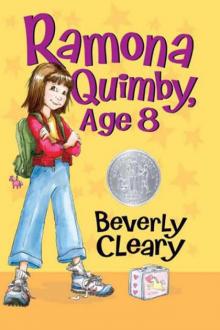 Ramona Quimby, Age 8
Ramona Quimby, Age 8 Dear Mr. Henshaw
Dear Mr. Henshaw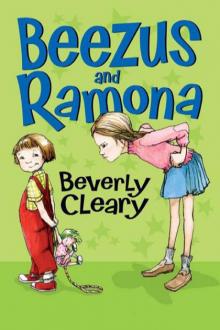 Beezus and Ramona
Beezus and Ramona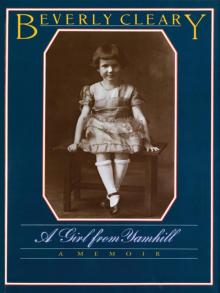 A Girl from Yamhill
A Girl from Yamhill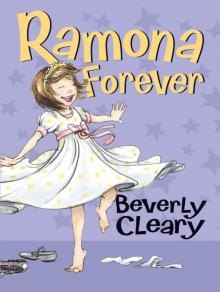 Ramona Forever
Ramona Forever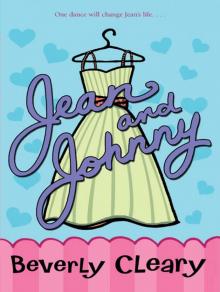 Jean and Johnny
Jean and Johnny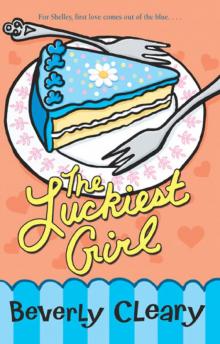 The Luckiest Girl
The Luckiest Girl Emily's Runaway Imagination
Emily's Runaway Imagination Ribsy
Ribsy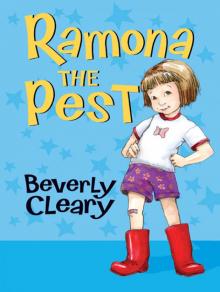 Ramona the Pest
Ramona the Pest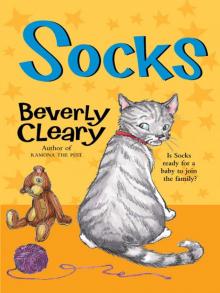 Socks
Socks Ramona's World
Ramona's World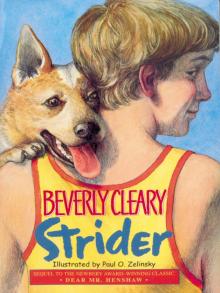 Strider
Strider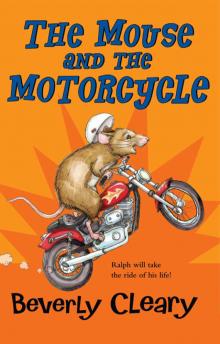 The Mouse and the Motorcycle
The Mouse and the Motorcycle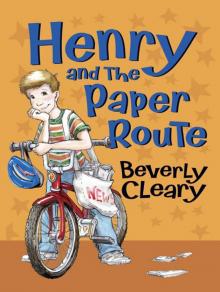 Henry and the Paper Route
Henry and the Paper Route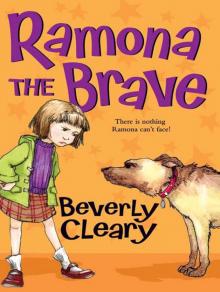 Ramona the Brave
Ramona the Brave Henry Huggins
Henry Huggins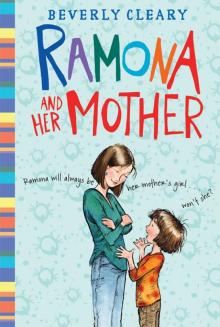 Ramona and Her Mother
Ramona and Her Mother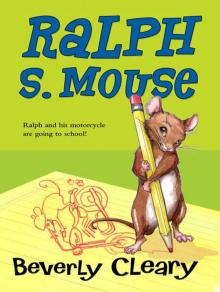 Ralph S. Mouse
Ralph S. Mouse Sister of the Bride
Sister of the Bride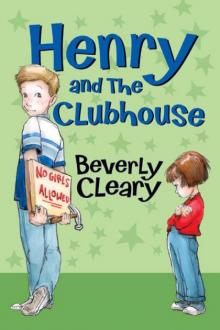 Henry and the Clubhouse
Henry and the Clubhouse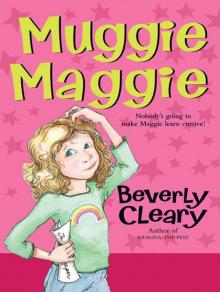 Muggie Maggie
Muggie Maggie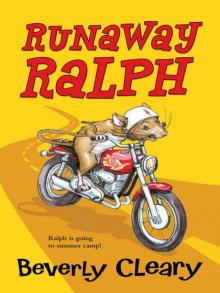 Runaway Ralph
Runaway Ralph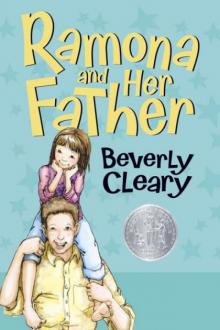 Ramona and Her Father
Ramona and Her Father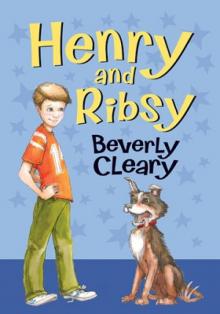 Henry and Ribsy
Henry and Ribsy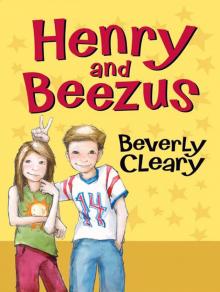 Henry and Beezus
Henry and Beezus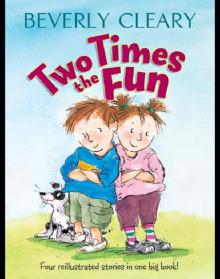 Two Times the Fun
Two Times the Fun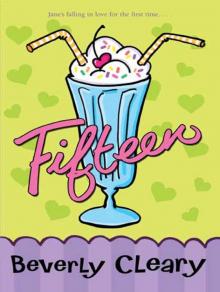 Fifteen
Fifteen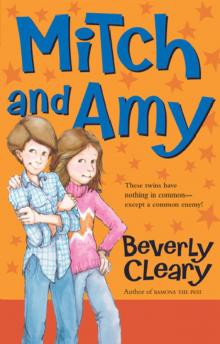 Mitch and Amy
Mitch and Amy